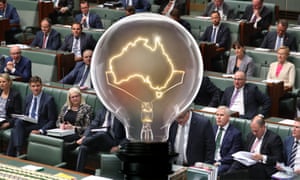By showing younger people politics can make a positive difference, we could attract the brightest and best to parliament
Australia’s future depends on clever, idealistic young people heading into politics.
We need honourable people with a big-picture plan. With regard to climate change, we don’t need new scientific or technological discoveries – we just need new politicians. We don’t have to invent fresh, complicated ways to burn coal more safely, we simply need political support to establish existing renewable technologies.
In 1967, Chairman Mao said, “Political power grows out of the barrel of a gun”. Well sure, it can – but the problem is that this involves violence and death. Both of which I’m keen to avoid. A far better solution is for political power to grow out of the parliament – which means we have to embrace politics.
There’s a long history of making a difference with politics.
We need honourable people with a big-picture plan. With regard to climate change, we don’t need new scientific or technological discoveries – we just need new politicians. We don’t have to invent fresh, complicated ways to burn coal more safely, we simply need political support to establish existing renewable technologies.
In 1967, Chairman Mao said, “Political power grows out of the barrel of a gun”. Well sure, it can – but the problem is that this involves violence and death. Both of which I’m keen to avoid. A far better solution is for political power to grow out of the parliament – which means we have to embrace politics.
There’s a long history of making a difference with politics.
First environmental political history example – with a happy ending
Back in the 1970s, it was discovered that certain chemicals (CFCs) were damaging the ozone layer. These CFC gases were pumped around inside your refrigerator, and gave your fridge “coolth”.
When they were invented around 1930, by Thomas F Midgley Jr, they looked exciting. CFCs initially seemed safe. Before them, refrigerant gases were either toxic or inflammable, or both. Thomas Midgley theatrically demonstrated the short-term safety of his new CFC invention in front of a huge crowd by filling his lungs with his new chemical, to prove that CFCs were not toxic to inhale. Then he breathed out the CFCs over a burning candle – and the flame blew out. Which proved that CFC was not inflammable. And made a fantastic impression on the excited audience!His new chemical seemed like a wonder.
But almost half a century later we realised that CFCs were causing a massive depletion of our high-altitude ozone layer.
How did we fix it? Well, the governments of the world took the environmental threat seriously. They banded together to set up the Montreal Protocol and legislated to abolish CFCs. Naturally, the several dozen companies that made CFCs at first claimed that there was no possible alternative chemical to replace CFCs. (They were lying.) The governments of the world stuck to their principles and said, “Just do it.” (Even before Nike owned that motto!) So a perfectly good alternative refrigerant gas was soon invented.
Politicians and scientists worked as a team and made laws based on scientific evidence to avoid the slow motion disaster that would have been the destruction of the ozone layer.
In the mid-1970s, Munich Re (the world’s largest reinsurance company) recognised that climate change was causing abnormal climate-related events. These events were costing money. So they increased insurance premiums.
Climatologists took more time (compared with insurance companies) and collected more data for the greater body of proof that scientists need, to act. But in 1989 (yup, that’s over three decades ago) the climatologists agreed that global warming was happening and that this time it was caused by humans.
Big Fossil Fuel looked at their options. Not idealistically – they were simply aiming to maximise their income for as long as they could.
For a few years they swapped emails among themselves – discussing the most successful business alternatives. They considered remaining energy companies who could gradually evolve out of burning carbon. But any change to their business structure meant accepting some risk to their profit margins.
Otherwise they could opt to stick with “business as usual”, burn coal, and back-up this plan with a well-funded denialist campaign about climate change not even being real. And if pushed to accept it was real they could then argue about whether it was caused by humans.
Big Fossil Fuel chose that second option.
They used techniques that had been polished to perfection by Big Tobacco, based on “Doubt Is Our Product”. (If you want the full story, read Merchants of Doubt by Naomi Oreskes and Erik M. Conway.)
Climate issues are pressing and need positive government. We still give “tax breaks” and “deferred royalties” to coalmining companies. We don’t even have a basic commitment from the government to start making meaningful changes. Only time will tell if our government manages to protect the environment from climate change impacts.
The duty of the government is to govern for the people and the future needs good politicians. So … get in there and become a politician, or if that’s not possible, then get in there and support the politician who believes the same things you do
Electing better politicians means we have a stronger chance of making meaningful improvements for the broad spectrum of humanity, and the planet.
- Dr Karl Kruszelnicki is a science communicator and author. His latest book is Dr Karl’s Random Road Trip Through Science, (Harper Collins, $35)

No comments:
Post a Comment